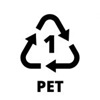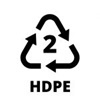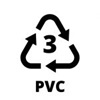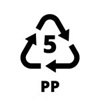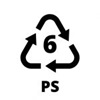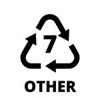How to recycle your plastics
Subscribe or renew your subscription for the year April 2024 to March 2025.
Residents can subscribe by paying the full amount, £93.50, by debit or credit card or by setting up a Direct Debit. Residents already subscribed will receive a sticker showing they are subscribed by 1 May 2024.
Subscribe now to make the most of your subscription period from April to March.
You can recycle most plastics at home. You’ll need to rinse plastics before putting them in your recycling bin, otherwise your collection will be classed as contaminated and sent for incineration.
There are seven different resin codes that manufacturers use on their packaging – this tells you what type of plastic is used. You can find out what each of these codes mean and how you can recycle your plastics below.
1. PET – Polyethylene Terephthalate (PET or PETE)
Where is it found? This is one of the most commonly used plastics. It is used for fizzy drinks, water bottles, salad trays, cooking oil bottles, packaging trays and other common everyday purchases.
Can it be recycled? Yes, you can recycle these items in your household recycling bin - please make sure you rinse all of the items first.
What is it turned into? PET is widely recycled back into the manufacturing of various items, including textiles, clothing, food and drink containers, insulation, First-Aid blankets, fleeces and even carpets!
2. High-Density Polyethylene (HDPE)
Where is it found? Milk bottles, bleach, detergents and some shampoo bottles.
Can it be recycled? Yes, you can recycle these items in your household recycling bin - please make sure you rinse all of the items first.
What is it turned into? It can easily be recycled back into items like non-food containers and detergent bottles.
3. Polyvinyl Chloride (PVC or Vinyl)
Where is it found? It is generally used in the manufacturing of carpet backing, pipes, and window and door frames.
Can it be recycled? You can recycle these items at the Recycling Centre on Landmann Way, New Cross. Please don’t put these items in your household recycling bin.
What is it turned into? Packaging, panelling, guttering, traffic cones and electrical equipment.
4. Low Density Polyethylene (LDPE)
Where is it found? Trays, containers, work surfaces, machine parts, lids, ‘six-ring’ drink holders, computer hardware casings, slides and other playground items, laundry bags, bin liners, packaging film, squeezable bottles and carrier bags.
Can it be recycled? You can recycle unwanted plastic bags and packaging at your local supermarket, or you can put them in your rubbish bin. They’re not accepted in your household recycling bin.
What is it turned into? These items can be turned into shipping envelopes, bin liners and carrier bags.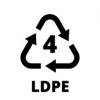
5. Polypropylene (PP)
Where is it found? Sportswear clothing, surgery tools and supplies, airplane model sets, bottle caps, food containers, straws, crisp bags, kettles, lunch boxes, packing tape, soup pots, margarine tubs, microwaveable meal trays, waterproof clothing and plastic bags. Its fibres are also used for carpets, wall coverings and some vehicle upholstery.
Can it be recycled? You can put margarine and soup pots in your recycling bin, as well as microwaveable meal trays (except black ones). Everything else can be recycled at the Recycling Centre on Landmann Way or you can put them in your rubbish bin.
What is it turned into? Clothing fibres, speed humps, compost bins, food containers, and more.
6. Polystyrene (PS)
Where is it found? It's most commonly used to protect items that are in transit, particularly electrical items like computers, cookers and fridges. It’s also used in takeaway food packaging.
Can it be recycled? You can recycle polystyrene at the Recycling Centre on Landmann Way. Alternatively, you can put it in your rubbish bin.
What is it turned into? Insulation and foam packaging.
7. Unallocated references – everything else (#7)
Plastics that do not fall into the above categories may be highlighted with the number 7 logo or the word “other”. If you are unsure, you can ask the manufacturer of the product or take it to the Recycling Centre on Landmann Way.
